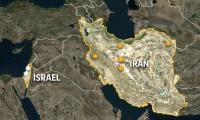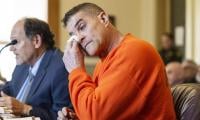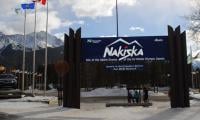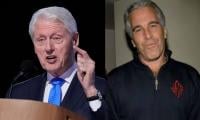Dhaka protests
The best indicator of how democratic a government is can be seen in the way it handles dissent. By that metric, the government of Prime Minister Sheikh Hasina in Bangladesh seems to be lagging. For over a week now, thousands have been protesting in Dhaka over road safety. The protest was spurred by the killing of two teenagers by a speeding bus, allegedly owned by the relative of a government minister. The reaction of the government to these protests shows how little tolerance it has for civil society protest and how quick it is to resort to violence. Last Saturday, more than 100 people were injured as police fired rubber bullets at protesters. The next day, renowned photographer Shahidul Alam was picked up by plainclothes police officials for being critical of the government in an interview he gave to Al Jazeera. Alam has been charged under a draconian law. With his arrest, however, the Bangladeshi state has hurt its own image. Alam’s friends say that he was badly beaten by the police, and international rights groups have called for his release. Alam himself said after a court appearance that he was tortured. It was only on the orders of a court that he was belatedly shifted to hospital to receive treatment for the injuries he suffered. The intent of the government, it seems, is to shut down all criticism – through violent means if necessary.
Apart from the violence against student protesters and the arrest of Alam, the Bangladeshi government has also blocked mobile phone signals and internet service in parts of Dhaka and other cities to make it more difficult for protesters to organise. Shahzahan Khan, the minister whose relative is believed to own the bus that killed two teenagers, furthered fuelled the protests when he said there is no outrage when people are killed in road accidents in countries like India. Human rights activists in Bangladesh claim that the death toll from the accident was actually higher but that information is being suppressed by the government. A government that relies on censorship, arbitrary arrests and misinformation to quell protests is only likely to end up fuelling even more public outrage. Dhaka is one of the most densely populated cities in the world and its residents know best how to improve road safety. Should they continue to be silenced, there is every chance of the protests widening.
-
 AI Safety Battle: Anthropic Fires Back At Pentagon After US Military Flags It ‘supply Chain Risk’
AI Safety Battle: Anthropic Fires Back At Pentagon After US Military Flags It ‘supply Chain Risk’ -
 OKC Vs Nuggets: NBA MVP Shai Gilgeous-Alexander Scores 36 In Fiery Overtime Win
OKC Vs Nuggets: NBA MVP Shai Gilgeous-Alexander Scores 36 In Fiery Overtime Win -
 Eric Dane's Biggest Regret Comes To Light Following Days Of His Death
Eric Dane's Biggest Regret Comes To Light Following Days Of His Death -
 Israel Launches Attack On Iran's Capital And Declares State Of Emergency
Israel Launches Attack On Iran's Capital And Declares State Of Emergency -
 At Least 15 Dead After Military Plane Carrying New Banknotes Plunges Out Of Control In Bolivia
At Least 15 Dead After Military Plane Carrying New Banknotes Plunges Out Of Control In Bolivia -
 OpenAI Partners With Pentagon After Trump Bans Anthropic AI
OpenAI Partners With Pentagon After Trump Bans Anthropic AI -
 Trump Orders Federal Agencies To Stop Using Anthropic AI Tools
Trump Orders Federal Agencies To Stop Using Anthropic AI Tools -
 Shocking Details Emerge In Martin Short’s Daughter Katherine's Death Investigation: 'Kept To Herself'
Shocking Details Emerge In Martin Short’s Daughter Katherine's Death Investigation: 'Kept To Herself' -
 Daniel Serafini Gets Life Without Parole In In-laws Murder And Attempted Murder Case
Daniel Serafini Gets Life Without Parole In In-laws Murder And Attempted Murder Case -
 Yerin Ha On Stepping Into The Spotlight In Bridgerton Season Four
Yerin Ha On Stepping Into The Spotlight In Bridgerton Season Four -
 Nakiska Ski Area Avalanche Leaves Youth Unresponsive, Second Skier Escapes Unhurt
Nakiska Ski Area Avalanche Leaves Youth Unresponsive, Second Skier Escapes Unhurt -
 Igor Komarov Missing In Bali: Seven Foreign Suspects Arrested In Kidnapping Probe
Igor Komarov Missing In Bali: Seven Foreign Suspects Arrested In Kidnapping Probe -
 'I Swear' Director Kirk Jones Says Bafta Broadcast Mishap Failed Tourette’s Advocate
'I Swear' Director Kirk Jones Says Bafta Broadcast Mishap Failed Tourette’s Advocate -
 Yogurt Shop Murders Solved: 1991 Austin Cold Case Finally Linked To Serial Killer
Yogurt Shop Murders Solved: 1991 Austin Cold Case Finally Linked To Serial Killer -
 Iran Tensions Rise As Trump Says He Is 'not Thrilled' With Nuclear Negotiations
Iran Tensions Rise As Trump Says He Is 'not Thrilled' With Nuclear Negotiations -
 Where Is Calvin Klein's Wife Kelly Klein Now After Divorce And Fashion Fame?
Where Is Calvin Klein's Wife Kelly Klein Now After Divorce And Fashion Fame?



